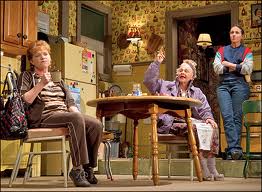In today’s Wall Street Journal I review the premiere of David Lindsay-Abaire’s Good People, which I didn’t like at all. Here’s an excerpt.
* * *
“Good People” is, or purports to be, a study of life in Southie, a down-at-heel Boston neighborhood beloved of movie stars who think they can do the local accent. Mr. Lindsay-Abaire, who comes from a real-life Southie family, managed to land a scholarship to a tony New England prep school, which was his escalator to fame and fortune. All this undoubtedly explains the plot of “Good People,” in which Margie (Frances McDormand, who works the charm pedal a bit too enthusiastically) is fired from her job as a clerk at a local dollar store, thus making it impossible for her to support her adult daughter, who was born prematurely and is severely handicapped (and who is kept offstage throughout the play, presumably so as not to shock the matinée crowd). In desperation, Margie looks up Mikey (Tate Donovan), an old high-school boyfriend who studied hard, became a doctor and now lives in a big house in a fancy suburb with his cute young wife (Renée Elise Goldsberry), who is–wait for it–an upper-middle-class black.
 In the first scene, we see Margie being canned for chronic lateness. Needless to say, it’s not her fault: She has babysitter problems. Indeed, her only flaw is an endearing one, which is that she can’t stop herself from saying what she thinks at any given moment, no matter how ill-timed it may be. Otherwise, she’s a basically good person, and that brings us to the moral of the play, which is that bad things happen to good people–and vice versa. Take Mikey, who believes that his success is his own doing and not a matter of luck, a conviction that has made him resentful and guilt-ridden, two qualities that manifest themselves in his willingness to treat Margie like dirt.
In the first scene, we see Margie being canned for chronic lateness. Needless to say, it’s not her fault: She has babysitter problems. Indeed, her only flaw is an endearing one, which is that she can’t stop herself from saying what she thinks at any given moment, no matter how ill-timed it may be. Otherwise, she’s a basically good person, and that brings us to the moral of the play, which is that bad things happen to good people–and vice versa. Take Mikey, who believes that his success is his own doing and not a matter of luck, a conviction that has made him resentful and guilt-ridden, two qualities that manifest themselves in his willingness to treat Margie like dirt.
Herein lies part of the phoniness of “Good People.” Of course people like Margie and Mikey exist, but I doubt it’s a coincidence that they are exactly the kinds of people who fit into the familiar sociological narrative that permeates every page of this play. In Mr. Lindsay-Abaire’s America, success is purely a matter of luck, and virtue inheres solely in those who are luckless. So what if Mikey worked hard? Why should anybody deserve any credit for working hard? Hence the crude deck-stacking built into the script of “Good People,” in which Mikey is the callous villain who forgot where he came from and Margie the plucky Southie gal who may be the least little bit racist (though she never says anything nasty to Mikey’s wife–that would be going too far!) but is otherwise a perfect heroine-victim.
No less phony, though, is the fact that “Good People” plays like a comedy, not a tragedy. For all their grinding poverty, Margie and her Southie friends are incapable of uttering two consecutive lines without tossing in a snappy comeback….
* * *
Read the whole thing here.
Terry Teachout on the arts in New York City
